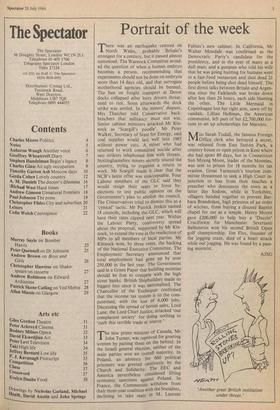Portrait of the week
There was an earthquake centred on North Wales, probably Britain's strongest for a century, but it passed almost unnoticed. The Warnock Committee avoid- ed the question of when a human embryo becomes a person, recommending that experiments should not be done on embryos more than 14 days old, and that surrogate motherhood agencies should be banned. The ban on freight transport at Dover docks collapsed after lorry drivers threat- ened to riot. Soon afterwards the dock strike was settled. In the miners' dispute, Mrs Thatcher told Conservative back- benchers that militancy must not win. Senior cabinet ministers attacked Mr Kin- nock as `Scargill's poodle'. Mr Peter Walker, Secretary of State for Energy, said coal supplies would last well into 1985 without power cuts. A miner who had returned to work committed suicide after two strikers telephoned him with threats. Nottinghamshire miners secretly toured the country, trying to organise a return to work. Mr Scargill made it clear that the NCB's latest offer was unacceptable. Four Labour members of the GLC said they would resign their seats to force by- elections to test public opinion on the Government's plan to abolish the council. The Conservatives tried to dismiss this as a `cynical' tactic. Mr Patrick Jenkin named 18 councils, including the GLC, which will have their rates capped next year. Within the Labour Party, controversy spread about the proposal, supported by Mr Kin- nock, to extend the vote in the reselection of MPs to all members of local parties. Mr Kinnock won, by three votes, the backing of the National Executive Committee. The Employment Secretary announced that total employment had gone up by over 250,000 in the last year. The Government said in a Green Paper that building societies should be free to compete with the high street banks. British Shipbuilders made its biggest loss since it was nationalised. The Chancellor of the Exchequer confirmed that the income tax system is to the com- puterised, with the loss of 6,000 jobs. Discussing the spread of heroin sales, Lord Lane, the Lord Chief Justice, attacked 'our complacent society' for doing nothing to `curb this terrible trade at source.'
The new prime minister of Canada, Mr John Turner, was reproved for greeting women by patting them on the behind. In the Israeli general election, neither of the main parties won an overall majority. In Poland, an amnesty for 660 political prisoners was greeted cautiously by the Church and Solidarity. The EEC and America nevertheless considered lifting economic sanctions against Poland. In France, the Communists withdrew from their three-year coalition with the Socialists, declining to take seats in M. Laurent
Fabius's new cabinet. In California, Mr Walter Mondale was confirmed as the Democratic Party's candidate for the presidency, and in the eyes of many as a dull man; and a gunman who told his wife that he was going hunting for humans went to a fast-food restaurant and shot dead 21 people before being shot dead himself. The first direct talks between Britain and Argen- tina since the Falklands war broke down after less than 24 hours, each side blaming the other. The Little Mermaid in Copenhagen lost her right arm, sawn off by vandals. Lillian Hellman, the American communist, left part of her £2,700,000 for- tune to set up scholarships for Marxists.
Miss Sarah Tisdall, the famous Foreign Office clerk who betrayed a secret, was released from East Sutton Park, a country house or open prison in Kent where she had spent 89 days, but in Connecticut Sun Myung Moon, leader of the Moonies, was sent to prison for 18 months for tax evasion. Great Yarmouth's tourism com- mittee threatened to seek a High Court in- junction to ban from their beaches a preacher who denounces the town as a latter day Sodom, while in Yorkshire, villagers banded together to prevent Bar- bara Brandolani, high priestess of an order of witches, from buying a disused Baptist chapel for use as a temple. Henry Moore gave £200,000 to help buy a `Duccio' Crucifixion for Manchester. Severiano Ballesteros won his second British Open golf championship. Jim Fixx, founder of the jogging craze, died of a heart attack while out jogging. He was found by a pass- ing motorist.
AJSG Another great British institution under threat.'










































 Previous page
Previous page